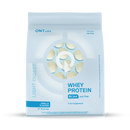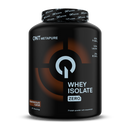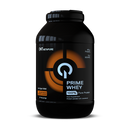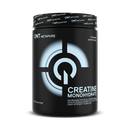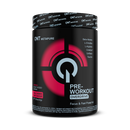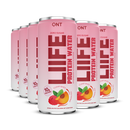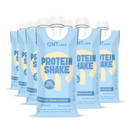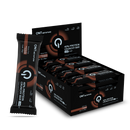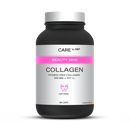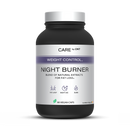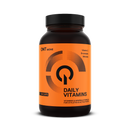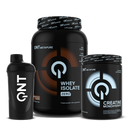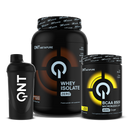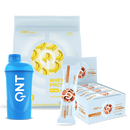Table of Contents
What is collagen exactly ?
Collagen is an essential fibrous protein, a major component of connective tissues in the human body, such as the skin, tendons, ligaments, and bones. It plays a crucial role in maintaining the structure, strength, and elasticity of these tissues. With age, the natural production of collagen decreases, leading to signs of aging like wrinkles and a decrease in bone density. Collagen is also important for joint health, helping to maintain their flexibility and mobility. Available in the form of supplements, collagen is often used for its benefits on skin health, wound healing, and support for bodily structures.
What are the health benefits of collagen ?
Collagen, a protein abundant in the human body, plays a crucial role in maintaining health and well-being. Its benefits are manifold and impact various aspects of our physical health.
- Skin Health: Collagen is essential for skin health. It helps maintain its elasticity and firmness, thus reducing the appearance of wrinkles and fine lines. By stimulating collagen production, one can slow down the signs of skin aging, promoting a younger and more radiant complexion.
- Joint Health: Collagen is also beneficial for joints. It contributes to maintaining the integrity of cartilage, the tissue that protects the joints. With age, the amount of collagen in the body decreases, increasing the risk of degenerative conditions like osteoarthritis. Collagen supplementation can help reduce joint pain and improve joint function.
- Bone Strength: Bones are largely composed of collagen, providing them with structure and strength. Taking collagen can help maintain bone density, which is particularly important in preventing osteoporosis, especially in women after menopause.
- Hair and Nail Health: Collagen can also enhance the health of hair and nails by strengthening nails and promoting hair growth. This can be particularly beneficial for those dealing with hair loss or brittle nails.
- Muscle Health Support: As a key component of muscle tissue, collagen is important for maintaining muscle strength and post-exercise recovery. This is especially relevant for athletes or older individuals looking to preserve their muscle mass.
- Enhanced Digestive Health: Some research suggests that collagen may support digestive health by strengthening the intestinal barrier. This can be beneficial for those suffering from digestive disorders like leaky gut syndrome.
Collagen offers a wide range of health benefits, from improving the appearance of the skin to preventing joint and bone disorders. Its supplementation can be a valuable addition to a health and wellness regimen, especially as we age and natural collagen production decreases.
How does collagen improve skin and hair health ?
Collagen, a vital protein for our bodies, plays a fundamental role in maintaining the health of the skin and hair. Its impact on these two aspects is significant and manifests in several ways.
- Skin Hydration and Elasticity: Collagen contributes to skin hydration and elasticity. As we age, natural collagen production decreases, leading to a loss of elasticity and the appearance of wrinkles. Collagen supplementation can help restore hydration and improve skin elasticity, reducing visible signs of aging.
- Reinforcement of Skin Barrier: Collagen helps strengthen the skin barrier, protecting the skin from external aggressors such as pollutants and toxins. A strong skin barrier is essential for maintaining healthy and resilient skin.
- Support for Wound Healing: Collagen plays a key role in the skin healing process. It aids in the formation of new tissue and accelerates skin repair, which is beneficial for cuts, scrapes, or other skin injuries.
- Hair Growth and Strength: Regarding hair, collagen acts by strengthening hair follicles, which can contribute to healthier hair growth and reduced hair loss. The amino acids present in collagen also help nourish hair from within, making it stronger and more resilient.
- Scalp Health: Collagen supports scalp health by improving elasticity and hydration. A healthy scalp is crucial for the growth of strong and healthy hair.
- Prevention of Hair Degradation: With age, hair can become thinner and more fragile. Collagen helps prevent this degradation by providing the necessary proteins to maintain hair structure and integrity.
Collagen is a crucial element in maintaining the health and appearance of the skin and hair. Whether it's improving skin hydration and elasticity or strengthening and nourishing hair, collagen offers significant benefits for those seeking to preserve their youth and vitality.
Can Collagen Help Improve Joint Health ?

Collagen is a key protein in the human body, playing an essential role in joint health. Its influence on joints is manifold and significant.
1. Maintenance of Joint Cartilage.
Collagen is a major component of cartilage, the tissue that covers and protects the ends of bones at the joints. With age, collagen production decreases, leading to cartilage wear and tear. Collagen supplementation can help maintain the integrity of cartilage, thus reducing the risk of degenerative conditions like osteoarthritis.
2. Reduction of Joint Pain.
Many studies have shown that collagen can reduce joint pain and improve joint function in people suffering from chronic joint pain or osteoarthritis. This is due to its anti-inflammatory properties and its ability to stimulate cartilage regeneration.
3. Improvement in Flexibility.
Collagen helps maintain the elasticity of connective tissues, which is crucial for joint flexibility. Improved flexibility can lead to better range of motion and a reduced risk of injuries.
4. Support for Post-Exercise Recovery.
For athletes or active individuals, collagen can help speed up the recovery of joint tissues after exercise, thereby reducing post-workout pain and stiffness.
5. Prevention of Joint Deterioration.
By providing the necessary building blocks for cartilage maintenance, collagen can play a preventive role against joint deterioration, especially crucial as we age.
Collagen is a valuable ally for joint health. Whether it's maintaining cartilage health, reducing pain, improving flexibility, supporting recovery, or preventing deterioration, collagen offers significant benefits for those looking to maintain or enhance their joint health.
What Are the Best Natural Sources of Collagen ?
Collagen is an essential protein for many aspects of our health, and it is naturally present in several foods. Here are the best natural sources of collagen:
- Bone Broths: Bone broths, prepared by simmering animal bones and connective tissue, are an excellent source of collagen. They also provide other joint-friendly nutrients like glucosamine and chondroitin.
- Meats and Fish with Skin: Meats rich in connective tissue, such as bone-in cuts of meat, as well as fish with skin, are good sources of collagen. Chicken skin and fish skin are particularly high in this protein.
- Gelatin: Gelatin, which is essentially cooked collagen, is another significant source. It is often used in cooking and can be added to soups, sauces, or desserts to boost collagen intake.
- Dairy Products: While less concentrated in collagen than the previous sources, some dairy products can contribute to collagen intake, especially protein-rich ones like cottage cheese and Greek yogurt.
- Foods Rich in Vitamin C: While vitamin C doesn't contain collagen itself, it is essential for collagen synthesis in the body. Vitamin C-rich fruits and vegetables like oranges, bell peppers, strawberries, and broccoli can help optimize collagen production.
- Foods Rich in Proline and Glycine: These two amino acids are important for collagen production. Eggs, dairy products, asparagus, mushrooms, and legumes are good sources of proline and glycine.
- Collagen Supplements: For those who struggle to obtain enough collagen through their diet, collagen supplements are a convenient option. They are available in various forms such as powders and capsules.
A diverse diet including bone broths, meats and fish with skin, gelatin, dairy products, as well as foods rich in vitamin C, proline, and glycine can provide a good source of natural collagen. Collagen supplements can also be considered to increase intake.
How to Choose an Effective Collagen Supplement ?
Choosing an effective collagen supplement is crucial to maximize its health benefits. Here are key criteria to consider when selecting a collagen supplement:
1. Type of Collagen: Importance and Choosing According to Needs.
Collagen is a complex protein and comes in several forms, each with specific functions and benefits in the body. Understanding these different types is essential for selecting a collagen supplement that suits your personal needs.
- 1. Collagen Type I: Type I collagen is the most abundant in the human body. It is mainly found in the skin, tendons, bones, and dental tissues. This type of collagen is crucial for maintaining skin elasticity and firmness, as well as bone strength. Supplements containing Type I collagen are often sought for their anti-aging effects, improving skin health, and strengthening bones and hair.
- 2. Collagen Type II: This type of collagen is mostly found in cartilage. It plays a key role in joint health and is often used in the treatment of osteoarthritis and other joint disorders. Type II collagen supplements are particularly beneficial for those looking to improve joint health, reduce joint pain, and maintain flexibility.
- 3. Collagen Type III: Type III collagen is abundant in muscles, blood vessels, and connective tissues. It is often associated with Type I in the body. Supplements containing Type III collagen are sought to support muscle structure and integrity, as well as cardiovascular health.
- 4. Other Types of Collagen: There are other types of collagen (up to 28 different types have been identified), but they are less abundant. Each of these types has specific roles in various tissues and bodily functions.
When choosing a collagen supplement, it's important to consider your specific health goals. For example, if you are primarily concerned about skin health and preventing signs of aging, a supplement rich in Type I collagen would be most appropriate. On the other hand, if you're looking to support joint health, a supplement primarily containing Type II collagen would be more suitable.
Understanding the different types of collagen and their respective functions is crucial in choosing a supplement tailored to your needs. This will allow you to more effectively target your health goals and optimize the benefits of the collagen supplement you select.
2. Source of Collagen
Collagen supplements are typically derived from animal sources such as beef (bovine), chicken, fish (marine), or pork. Marine collagens are often preferred for their high bioavailability and easy absorption.
- Purity and Quality: Check the product's purity. A good collagen supplement should not contain fillers, unnecessary additives, or added sugars. Look for products that have undergone third-party quality and purity testing.
- Certifications and Labels: Certifications like organic, non-GMO, or halal/kosher certifications can be important depending on your dietary preferences or ethical requirements.
- Supplement Form: Collagen is available in various forms, including powders, capsules, and liquids. Powders are popular as they can be easily mixed into beverages or foods, but choose the form that best suits your lifestyle.
- Dosage and Instructions: Ensure the supplement provides clear dosage and usage instructions. Proper dosage is crucial for achieving desired results.
- Brand Reviews and Reputation: Research consumer reviews and the brand's reputation. User reviews can provide valuable insights into the product's effectiveness.
- Presence of Additional Nutrients: Some collagen supplements contain added nutrients like vitamin C, which is essential for collagen synthesis. These additions can enhance the supplement's effectiveness.
Therefore, choosing an effective collagen supplement is important. This involves considering the type of collagen, the source, purity, certifications, supplement form, dosage, consumer reviews, and the presence of other beneficial nutrients. Careful selection can help you find a product that meets your specific needs and maximizes health benefits.
Is Collagen Beneficial for Athletes ?
Collagen, as a key protein in the body, offers several specific benefits for athletes, ranging from injury prevention to performance enhancement. Here's how collagen can be particularly beneficial for those who engage in regular physical activity:
- 1. Joint and Tendon Support: Collagen is an essential component of cartilage, tendons, and ligaments. For athletes, collagen supplementation can help strengthen these tissues, reducing the risk of injuries such as sprains, tendonitis, and ligament damage.
- 2. Enhanced Muscle Recovery: After intense training, muscles may experience micro-tears. Collagen aids in muscle fiber repair and reconstruction, which can accelerate recovery and reduce post-workout muscle soreness.
- 3. Bone Health Support: Sports activities often put a strain on bones. Collagen contributes to bone density and strength, which is crucial for preventing fractures and other bone injuries.
- 4. Improved Athletic Performance: Some studies suggest that collagen can enhance joint elasticity and flexibility, which can translate to improved athletic performance, especially in terms of mobility and agility.
- 5. Skin Hydration and Elasticity: Although less directly related to sports performance, collagen also helps maintain healthy and resilient skin, which can benefit athletes exposed to outdoor elements and repeated friction from sports equipment.
- 6. Long-Term Joint Deterioration Prevention: For athletes engaged in high-impact or long-term sports, collagen supplementation can help prevent cartilage degradation and joint issues that may occur over time.
Collagen is, therefore, a valuable supplement for athletes, offering benefits ranging from injury prevention to enhanced recovery and performance. By supporting joint, muscle, bone, and skin health, collagen helps athletes maintain their bodies in optimal condition for sports participation.
Are There Any Side Effects to Taking Collagen ?
While collagen is generally considered safe and well-tolerated, it's important to be aware of potential side effects associated with its supplementation. Here's an overview of possible side effects and precautions to take:
- Allergic Reactions: Collagen supplements are often derived from animal sources such as beef, chicken, fish, and pork. People allergic to these sources may experience allergic reactions. Therefore, it's crucial to check the source of collagen in the supplement and ensure it is compatible with your allergies or sensitivities.
- Digestive Issues: Some individuals may experience mild digestive disturbances, such as bloating, diarrhea, or a feeling of heaviness in the stomach, especially when taking high doses of collagen.
- Unpleasant Taste and Odor: Some collagen supplements, especially those in powder form, may have an unpleasant taste or odor for some users, although this is not a harmful side effect.
- Protein Overload: While rare, excessive collagen consumption can contribute to protein overload, especially if the diet is already high in protein. This can put additional strain on the kidneys.
- Drug Interactions: While there is no strong evidence of drug interactions with collagen, it is always advisable to consult a healthcare professional before starting supplementation, especially if you are taking other medications.
- Product Quality and Purity: Side effects can also be related to the quality of the supplement. Poor-quality or contaminated products can pose health risks. Therefore, it's important to choose high-quality collagen supplements that have been third-party tested.
So, while collagen supplementation is generally safe for most people, it's important to consider potential side effects and choose high-quality products. If in doubt or if you have pre-existing medical conditions, it's always advisable to consult a healthcare professional before starting collagen supplementation.
What Is the Difference Between Marine Collagen and Other Types of Collagen ?
Collagen, an essential protein for human health, can be derived from various sources, each with unique characteristics. Understanding the differences between marine collagen and other types of collagen is important when choosing a supplement that suits your needs.
- Source and Composition: The primary difference between marine collagen and other types of collagen lies in their source. Marine collagen is derived from the skin, scales, and bones of fish, while other forms of collagen are typically extracted from land-based sources such as beef, pork, or chicken. This difference in source affects the amino acid composition and structure of the collagen.
- Type of Collagen: Marine collagen is primarily composed of type I, the same type abundant in human skin. This makes it particularly beneficial for skin, hair, and nails. Other types of collagen, like those derived from bovine or porcine sources, may include a combination of types I, II, and III, offering varied benefits for bones, joints, and muscles.
- Bioavailability: Marine collagen is often considered to have superior bioavailability, meaning it is more easily absorbed and utilized by the body. This is due to its smaller particle size, making it easier to absorb in the digestive system.
- Allergies and Sensitivities: For individuals allergic or sensitive to land-based products, marine collagen may be a safer alternative. However, it's important to note that those with seafood allergies should exercise caution with marine collagen.
- Ethical and Environmental Considerations: Ethical and environmental preferences can also influence the choice between marine collagen and other types. Marine collagen is often perceived as a more sustainable option, especially if the fish is sourced from sustainable fisheries.
The choice between marine collagen and other types of collagen depends on several factors, including the source, type of collagen, bioavailability, personal allergies or sensitivities, and ethical and environmental considerations. Each type offers unique benefits, and the choice should align with your specific health goals and personal preferences.
Coach's Tips.
- If you engage in activities where your skin is exposed to environmental elements, such as swimming or regular sun exposure, and you feel that time is taking a toll on your skin, joints, or hair, collagen is an essential ally to ward off the signs of aging.
- During your training sessions, your joints and tendons undergo significant stress. Collagen can help you prevent tendon, muscle, or joint injuries and also supports better recovery after a workout.
- QNT offers hydrolyzed collagen, which is absorbed more quickly and readily available for the body.
Read more
 Training
TrainingGroup classes more effective than classroom work?
We often ask this question: which one is the most effective? Group training or individual workout programs in the gym? Let's first consider the two...
Summer body edition for men: How to prepare your body?
Gentlemen ? The return of the sun and its warm rays are almost here! The degrees are slowly but surely rising, but what about your muscles? Ouch! I...
 Training
TrainingSHOULD YOU USE A WEIGHT BELT FOR LIFTING?
The next person you see in the squat cage with 20 kg on the bar and a big belt, maybe you can make a comment after reading these few lines.
 Our Tips
Our TipsHow to train flexibility?
The way to train flexibility is often highly controversial. Depending on the sports you practice, you work differently. A dancer and an athlete tra...
 Dietary Supplements
Dietary SupplementsWhy take turmeric?
There are hundreds and hundreds of spices with different properties and turmeric is obviously one of them! It is a spice that is generally quite we...
Which fat burner to choose?
To lose weight and burn fat, there is no secret: you have to do sport and take care of your diet. However, it is possible to speed up the process t...
 Our Tips
Our TipsFasting and sport: 9 tips for training during Ramadan.
Working out during Ramadan is not easy. Not eating from sunrise to sunset is a major challenge for athletes wishing to continue their activities. T...
 Our Tips
Our TipsSummer holidays: How to limit the damage?
On holiday, we often tend to let ourselves go. Unless you're a hardcore sportsman, you tend to abandon your trainers and indulge in a lot of dietar...
 Health
HealthHow to preserve your joints?
We have a total of about 400 joints located throughout the body. We therefore quickly understand why joint problems are quite common. You don't hav...
 Our Tips
Our Tips9 good reasons to do sport.
Sometimes the urge to exercise is not always there. And although we always tell ourselves that this year will finally be the right one to get back ...

